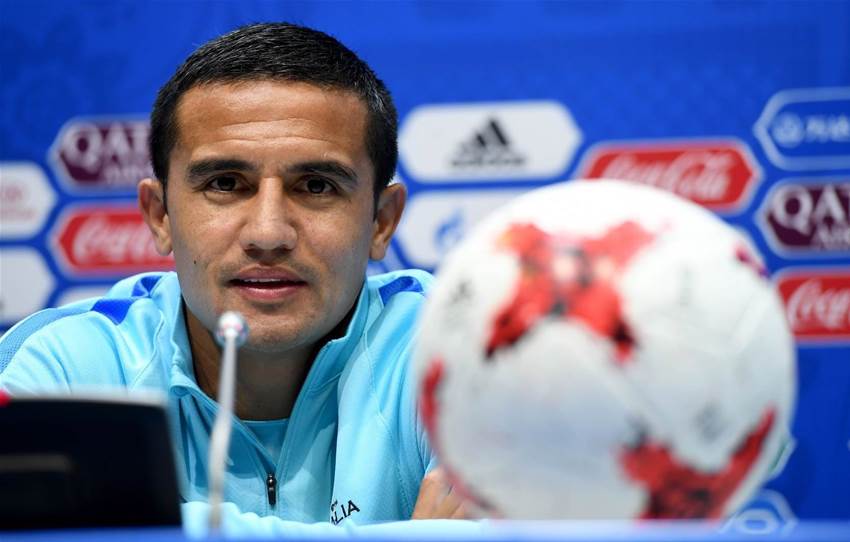In the early hours of Tuesday morning (AEST), Ange Postecoglou’s Socceroos face the toughest test of their FIFA Confederations Cup campaign: world champions Germany.
Fellow Group B opponents Chile may have a more talented squad at the tournament, but it will be Australia’s encounter with Germany that sets the tone for their Russian campaign.
With unpredictable Cameroon and the red-hot South Americans to come, a thrashing at the hands of Joachim Löw would all-but end the Socceroos’ hopes of progressing to the semi-finals.
PIC SPECIAL: Socceroos train in Sochi
Embattled coach Ange Postecoglou has pulled a few rabbits out of the hat during his long and varied managerial career.
But a win on the shores of the Black Sea against the world champions would surely be his greatest.

History
Whatever the result in Sochi, the echoes of history will ring loudly.
Australia has played Germany three times in FIFA competitions, managing a respectable 4-3 defeat at the 2005 Confederations Cup but losing by considerable margins at the 1974 and 2010 World Cup.
Indeed, many Australian fans still harbour collective trauma at the inept performance of Pim Verbeek’s charges in Durban seven years ago, when the Socceroos were comprehensively outplayed.
More recent memory offers some hope. Australia beat Germany in a friendly in 2011, and then held Die Mannschaft to a draw four years later in another non-competitive fixture.
Vital to repeating such efforts will be defensive solidity in the opening stanza, unlike the Socceroos’ recent showing against Brazil.
At the 2010 World Cup, Lukas Podolski scored in the eighth minute and Germany’s victory never looked in doubt.
If Löw’s side again score early, it may feel like déjà vu.
PIC SPECIAL: Socceroos train in Sochi

Baby Die Mannschaft
Germany’s line-up in Sochi will be young and inexperienced, with manager Löw leaving the likes of Mario Gomez, Toni Kroos, Thomas Muller and Mesut Özil at home.
The most capped player in the current German squad is just 23, while only a handful of players were part of the World Cup-winning 2014 team.
Could this fresh-faced side be ripe for the picking, or will the likes of Niklas Sule and Amin Younes emerge as the next generation of German superstars?
Australia might be advantaged by facing Germany first, with Löw’s efforts to settle his new line-up a work in progress.
Or, the Socceroos could be the first side to face defeat at the hands of yet another era of German footballing dominance.
Postecoglou, though, was not buying into such talk during the pre-match press conference.
“Let’s dispel one myth,” said the 51-year-old manager on Sunday. “When the teams walk out tomorrow, I would have a guess that we will be younger.”

Sandro Wagner
Defying the youthful trend in Löw’s side is Hoffenheim striker Sandro Wagner, the oldest player in the squad at 29.
A product of Bayern Munich’s famed youth academy, Wagner is an imposing six-foot-three presence in the penalty box.
He bloomed late, enduring uninspired stints at Werder Bremen and Hertha Berlin, before finding his rhythm in 2015 at Darmstadt and securing a move to Bundesliga contenders Hoffenheim.
Wagner’s 11 league goals in 30 starts helped Hoffenheim improve from 15th to fourth this year, and his form continued on competitive debut for Germany with a hat-trick against minnows San Marino.
Australia’s likely back-line of Milos Degenek, Ryan McGowan and Trent Sainsbury can all match Wagner for physicality, setting the stage for an intriguing defensive battle in Sochi.
PIC SPECIAL: Socceroos train in Sochi

Is the pressure getting to Ange?
Postecoglou is well-known among Australian sports writers for being combative in his dealings with the press.
British journalist Rob Harris of Associated Press called out the Socceroos’ boss during the pre-match press conference, asking: “Ange, you seem a bit irritated and prickly with some answers today. Is that a sign of uneasiness or pressure?”
“You must know me really well,” Postecoglou fired back. “How many times have you met me before? First time? Maybe that’s just my demeanour. There’s your answer.”
Even by Postecoglou’s standards, this was a pointed response.
With World Cup qualification far from secure and three difficult opponents ahead this week, is the pressure getting to him?

Who cares?
The Confederations Cup is the neglected sibling of the World Cup.
To its critics, the tournament is no more than a series of glorified international friendlies.
While the Confederations Cup fulfils a valuable administrative function, providing a dry-run to assure FIFA that preparations for its flagship event are on-track, players and fans could be forgiven for being apathetic after a lengthy club season.
It seems that such disinterest extends to the hosts, with the local organising committee admitting in April that ticket sales were low.
Whether locals and holidaymakers in Sochi, a picturesque resort town on the Black Sea, are sufficiently interested to fill the 47,659 Fisht Olympic Stadium remains to be seen.
Make no mistake, though. If Australia do well in Russia, the tournament’s second-rate status will be swiftly forgotten.
Related Articles

Socceroos midfielder embraces move to England

Cardiff City snap up sought-after Socceroos starlet













